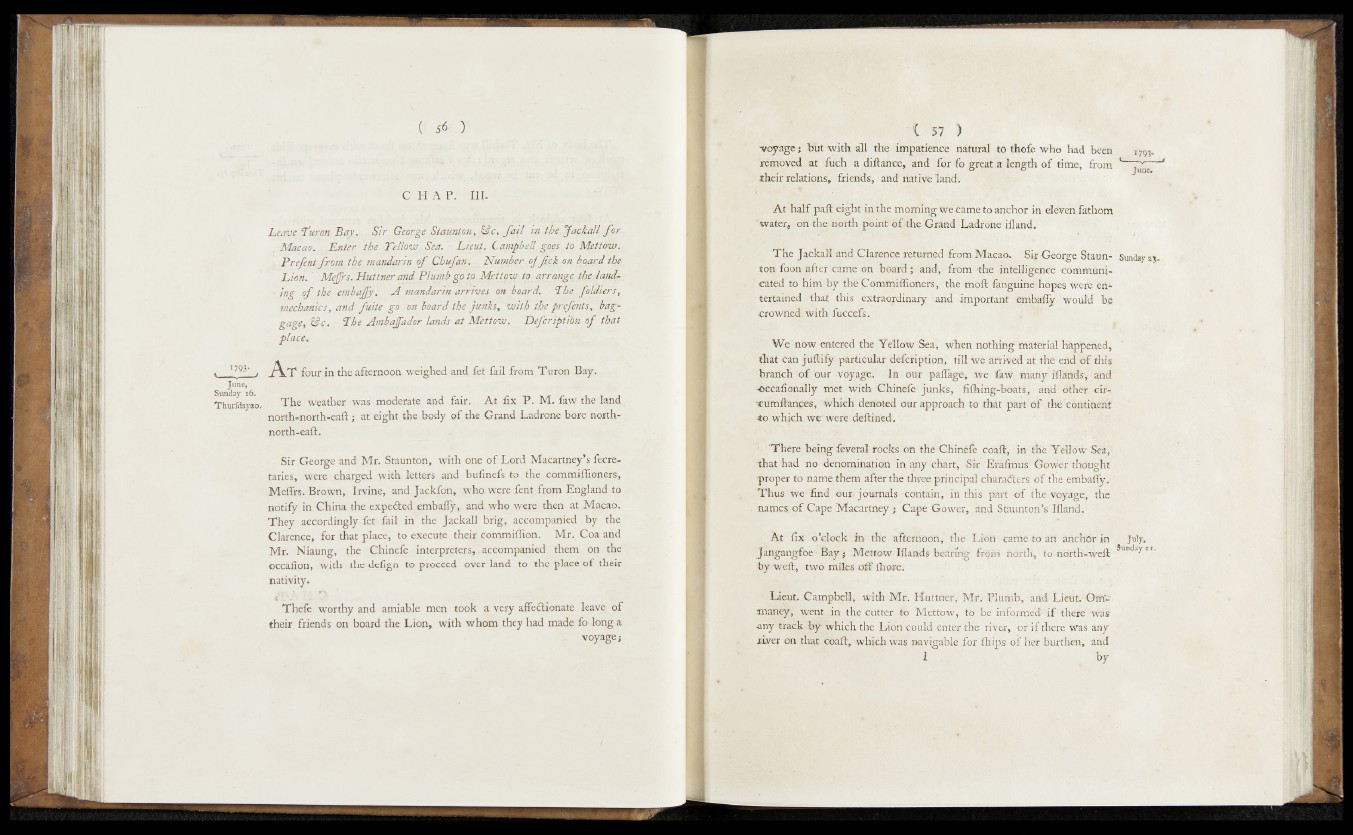
■ m
i ij 1
1 IS
1 1 1 1 B f l 1 ■ ■
m |j)i, 9
I f 1
C H A P . III.
1 ■ 1
heave Turon Bay., Sir George Staunton, &c. fa il in the Japkall for.
P I I
, Macao. Enter, the Telloyu Sea. Lieut. Campbell gpes to Mettow:
, Prejentfro'm^e mandarin offhufan.
L io n .' MeJJrs. Huitner and Plumb go to Mettow to arrange the.land-.
■ ing of the embajfy. A mandarin arrives onboard. Lhe foldiers,
H i ! I
mechanics, and fuite go on board the junks, with the prefents, bag.-
gage, f>c. Lhe Ambajador lands at Mettow% Defer iption o f that
I I place.
H 1 1 . 1?93.’ , ^ \ .T four in the afternoon weighed and fet fail from Turon Bay.
Su iUne’i6
Thurfdayao. The weather was moderate and fair. „ At fix P . M.Maw the land,
H I I
nortb-north-eaft ; at eight die body o f the .Grand Ladrone boje, north- I north-éaft.
1
Sir George and Mr. Staunton, with one o f Lord Macartney’s fecre- V
taries, were charged with letters and bufinefs to the commlffioners, _
■ ! :| I Meffrs. Brown, Irvine, and Jackfon, who were fent from England to
notify in China the expended embalfy, and who were then,at Macao.
I f
They accordingly-fet fail in the Jackall brig, accompanied by the*'.
Clarence, for that place, to execute their;- commiffion, , Mr. Coa_ and
Mr. Niaung, the ’ Ghinefe interpreters,. accompanied them op,; the" j
occafion, with the defign to proceed over land to the place o f thèir
& nativity.
lir 1 1 | Thefe worthy and amiable mep took a veiy affectionate Jeav£. o f
their friends on board the Lion, with whona they had made fo long a
1 8 }
voyage;
i 1 7 }
voyage ; Vut w ith all the impatience natural to thofè who had heeft
fémoved at iuch a diftanee, and for fo great :a length of time, from
1 theirrelation's, friends, and native land. •v
At 'Half paft eight in the hiojjmng weïame to anchor in eleven fathom
’ water,1- dfo -the-n©f th point Sfthe Grated Ladxone iflaiid.'
fe>Xhe Jackal’1 and Clarence returned from M"acaó% Sif George Staun- Sunday sj,
ton fo’omjfter came on bêtëtH ;i diid, ^fr&m the jntéllij^énéé communicated
fbdjiïri b y ’the CommiffióïlerS, ihe’öioft •fènguifi^hóp'es iveréeri- '
pertained that ’ t|rs ! extraordinary 'and important' i'ëtóbatfy would bê
crowned’ Wxth,fucGd[si,
■ - We now entered thé Ydlow'Séav When nèthïh’g matefiafl happened*
that can juflify particular difefiptiop, t i l we affiVed at thé erkf-é’f this
branch o f oür vsyagë. Ill out paffege-, -We faw, idkfiy* ifl&idsV' and
^éfcéaflöhally mét with dhinëfë1 ’ fifhing-boats, and êthëfc dfltf
cumftangés, which denoted óur approach tö that part o f thé continent’
to which we-were déftined»1
'There being'fevetal rèöks on the Chiftêffe coaft, in Öfè Yélloxb Sea,)
that had no denomination any chart,1 ïSm-'BMÖèMs1 Gb®èriö®#ght
proper to name them after tbe three principal chïraéfers o f the embaffy.
Thus-Wef®rid riur. journals cöritifite, in this part o f the Vpydgé, the '
names o f Cape 'Macartney ; Cape Gower, djid SlkuntoÉlis1 IlbÈrtèL
At f i x o ’eloek in the-adleihoon, thé» Iriorfi carne*to,^d anchor in July,
Jangaügfèe • Bay; 'Meköw Mandé' 'bêSrïïïg &oM .iiortll, to -norths weft ’9unday **'
byweft, two miles oft fhare.
Lieut. Campbell, with Mr. Ifiitfffef, X?Iumb-Plag | Lieut. 0 ‘m’J
rnaneyi went imltlje cutter to MetfóW, tö' be• ipforme®^f there 9pSj
any track by'Vhichlhë Li««5 could ent|j tk e'r iW , of fepcriè any A
■ river on that coaft, which was navigable for <fliips o f her burthen, and ’
I by